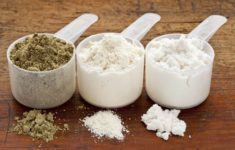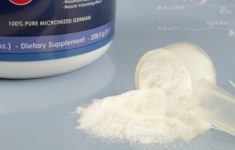First of all, what is creatine? It’s an amino acid, to be precise, a combination of three amino acids – glycine, arginine, and methionine.
Creatine is a crucial component for energy production in your body, i.e. your muscle cells. The way it works is through a production of another compound, namely adenosine triphosphate (ATP) which is the main form of energy in muscle cells.
When creatine monohydrate kicks in, you are able to perform well above average due to its ability to produce more ATP.
Additional power can be produced with phosphocreatine, which is another molecule that recycles energy from ATP.
Creatine monohydrate, as the name would suggest, has one molecule of water. It’s giving your body more strength and power and at the same time providing muscle cells with water.
What Is Creatine Monohydrate Good For?
There are many creatine supplements, but creatine monohydrate is probably most commonly referred to in relation to sports and benefits it has on physical performance.
Positive side effects of creatine monohydrate are improved muscular performance, more power output and strength overall.
Supplementing with creatine monohydrate can improve your performance in the short term and in a so-called creatine loading phase, where you consume 20 g of creatine monohydrate per day for a week [1].
Additional benefits of creatine monohydrate are stronger muscles and an ability to achieve better performance while doing high-intensity workouts.
When Should I Take Creatine Monohydrate?
There are two options for taking any enhancement product for exercise – taking it on workout days and/or on rest days. Why would anyone use creatine monohydrate on rest days, you may ask?
On your rest day, the reason for its consumption would be to keep the amount of this substance in your muscles high, so you could perform better during the days you do workout on.
On your workout days, it is wise to take your pre-workout supplement shortly before or shortly after training.
You can include this supplement in your diet, just need to watch for the nutrition spread so you don’t go overboard with the amount you consume.
When you start using creatine, if increasing muscle fast is what you want, then you probably want to go with the loading phase.
If you want to go slow, then the recommended daily dosage is 3 g of this substance for optimal results and improved performance.
Taking 3 g or even more, like 5 grams every day is a regular dose for those who want to improve strength and power in their training.
Check out this article and find out what are the best times to take creatine.
Is Creatine Monohydrate the Best Form of Creatine?
Among many forms of creatine, creatine monohydrate is certainly the most popular. The reason why most fitness experts and nutritionists will recommend creatine monohydrate is because it is the most researched type of creatine.
A significant amount of research shows that creatine monohydrate, as a product, is safe to use when it comes to long term consumption as well as short term [2].
Studies have proved that between various effects of creatine, the most common side effect of its consumption is weight gain [3].
Creatine monohydrate is the most beneficial form when it comes to endurance, energy production, muscle gain, improvement of physical performance and much more.
More Benefits
For example, creatine monohydrate is better than ethyl ester in terms of its retention in blood and muscles [4].
Among many benefits, creatine monohydrate can be easily found and used as a single ingredient and product. When you go to the store and choose between many supplements, you are not forced to buy a group of ingredients just so you can use creatine monohydrate.
Often, creatine monohydrate is the cheapest product compared to other sports supplements which is ironic due to its power to boost your performance and build muscle mass.
Creatine and Protein
Creatine monohydrate can be used in combination with whey protein for achieving better results in the gym. Taken with protein, this substance can produce high amounts of energy and lead to faster muscle growth.
There are protein-based products that are good for gaining additional power. Also, consuming protein with creatine is proven to be highly beneficial if you want to increase muscle faster.
Getting more protein in your product and having your protein synthesis enhanced leads to more muscle gains in the long run [5].
Can Creatine Increase Your Testosterone Levels?
This supplement is highly beneficial to your training and exercise routines. Creatine monohydrate may be best suited for high-intensity exercise (sprints and weight lifting).
People talk it up as a testosterone booster, but is this a real thing or just a marketing ploy used to increase product sales?
This substance helps you exercise longer and lift more weights. Lifting weights is connected with growth in testosterone levels. So, we could say that there is a correlation between creatine use and testosterone.
Indirectly it affects your testosterone levels, but can it also have a direct effect on them?
Well, sorry to burst your bubble with high hopes, but as far as science goes, the only thing creatine supplementation does (when talking about testosterone) is give you a slight increase in dihydrotestosterone or DHT.
DHT is (kind of) responsible for hair loss, maybe, in some cases.
Read: Creatine for Women: Should Women Take It?
Is Creatine a Steroid?
There are many people who, for some reason, think that creatine is an anabolic steroid. This is completely untrue. Creatine is one hundred per cent a natural substance found in the human body, and more specifically, muscles.
Even though like an anabolic steroid, as a supplement, creatine gives you an increase in performance, there is no evidence pointing to creatine being anything else than a natural substance.
Most common food sources for creatine are meat, fish and poultry. Creatine is also one of the most common ingredients in pre-workout supplements.
The most popular type of creatine is creatine monohydrate.
Read: 7 Best Pre Workouts Without Creatine
Will Creatine Give You Cramps?
We all probably know that using this dietary supplement can lead to things like diarrhea, dehydration, increased heart rate, etc. Getting cramps from it is less common but it can result in dehydration.
When dehydrated, your blood supplies are low on water which can lead to cramps. You can solve this issue easily by drinking more water.
Creatine may give you cramps if you are not careful with the dosage. Using 5 or more grams per serving can be a lot for someone who just started supplementing.
Do Professional Athletes Use Creatine Monohydrate?
Many professional athletes utilize this product to increase creatinine levels and achieve better results.
A lot of them use it in their diet which is just one of well-researched ways you can consume this product.
The reason why many competitors use it is that regardless of the sport or athletic discipline they partake in, the general view is that one way or another, this product is safe and has many benefits.
Many of them take this product with protein (protein supplements creatine, very well).
The high amount of protein is beneficial for high-intensity exercise and using it in combination with creatine can lead to better results and is considered to be beneficial for your health.
The Bottom Line
This substance is highly beneficial and safe to consume for most people.
Many people are consuming it daily and it is proven to be highly effective for all sorts of exercises and workouts.
References
- https://www.ncbi.nlm.nih.gov/pmc/articles/PMC2048496/
- https://pubmed.ncbi.nlm.nih.gov/28615996/
- https://pubmed.ncbi.nlm.nih.gov/12701816/
- https://pubmed.ncbi.nlm.nih.gov/19228401/
- https://www.ncbi.nlm.nih.gov/pmc/articles/PMC5537849/






